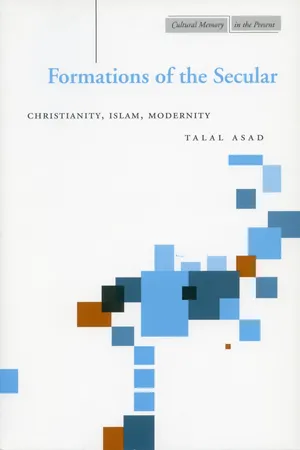![]()
Cultural Memory in the Present
Talal Asad, Formations of the Secular: Christianity, Islam, Modernity
Dorothea von Mücke, The Rise of the Fantastic Tale
Marc Redfield, The Politics of Aesthetics: Nationalism, Gender, Romanticism
Emmanuel Levinas, On Escape
Dan Zahavi, Husserl’s Phenomenology
Rodolphe Gasché, The Idea of Form: Rethinking Kant’s Aesthetics
Michael Naas, Taking on the Tradition: Jacques Derrida and the Legacies of Deconstruction
Herlinde Pauer-Studer, ed., Constructions of Practical Reason: Interviews on Moral and Political Philosophy
Jean-Luc Marion, Being Given: Toward a Phenomenology of Givenness
Theodor W. Adorno and Max Horkheimer, Dialectic of Enlightenment
Ian Balfour, The Rhetoric of Romantic Prophecy
Martin Stokhof, World and Life as One: Ethics and Ontology in Wittgenstein’s Early Thought
Gianni Vattimo, Nietzsche: An Introduction
Jacques Derrida, Negotiations: Interventions and Interviews, 1971–1998, ed. Elizabeth Rottenberg
Brett Levinson, The Ends of Literature: Post-transition and Neoliberalism in the Wake of the “Boom”
Timothy J. Reiss, Against Autonomy: Global Dialectics of Cultural Exchange
Hent de Vries and Samuel Weber, eds., Religion and Media
Niklas Luhmann, Theories of Distinction: Redescribing the Descriptions of Modernity, ed. and introd. William Rasch
Johannes Fabian, Anthropology with an Attitude: Critical Essays
Michel Henry, I Am the Truth: Toward a Philosophy of Christianity
Gil Anidjar, “Our Place in Al-Andalus”: Kabbalah, Philosophy, Literature in Arab-Jewish Letters
Hélène Cixous and Jacques Derrida, Veils
F. R. Ankersmit, Historical Representation
F. R. Ankersmit, Political Representation
Elissa Marder, Dead Time: Temporal Disorders in the Wake of Modernity (Baudelaire and Flaubert)
Reinhart Koselleck, The Practice of Conceptual History: Timing History, Spacing Concepts
Niklas Luhmann, The Reality of the Mass Media
Hubert Damisch, A Childhood Memory by Piero della Francesca
Hubert Damisch, A Theory of /Cloud/: Toward a History of Painting
Jean-Luc Nancy, The Speculative Remark (One of Hegel’s Bons Mots)
Jean-François Lyotard, Soundproof Room: Malraux’s Anti-Aesthetics
Jan Patočka, Plato and Europe
Hubert Damisch, Skyline: The Narcissistic City
Isabel Hoving, In Praise of New Travelers: Reading Caribbean Migrant Women Writers
Richard Rand, ed., Futures: Of Derrida
William Rasch, Niklas Luhmann’s Modernity: The Paradox of System Diffirentiation
Jacques Derrida and Anne Dufourmantelle, Of Hospitality
Jean-François Lyotard, The Confession of Augustine
Kaja Silverman, World Spectators
Samuel Weber, Institution and Interpretation: Expanded Edition
Jeffrey S. Librett, The Rhetoric of Cultural Dialogue: Jews and Germans in the Epoch of Emancipation
Ulrich Baer, Remnants of Song: Trauma and the Experience of Modernity in Charles Baudelaire and Paul Celan
Samuel C. Wheeler III, Deconstruction as Analytic Philosophy
David S. Ferris, Silent Urns: Romanticism, Hellenism, Modernity
Rodolphe Gasché, Of Minimal Things: Studies on the Notion of Relation
Sarah Winter, Freud and the Institution of Psychoanalytic Knowledge
Samuel Weber, The Legend of Freud: Expanded Edition
Aris Fioretos, ed., The Solid Letter: Readings of Friedrich Hölderlin
J. Hillis Miller / Manuel Asensi, Black Holes lJ. Hillis Miller; or, Boustrophedonic Reading
Miryam Sas, Fault Lines: Cultural Memory and Japanese Surrealism
Peter Schwenger, Fantasm and Fiction: On Textual Envisioning
Didier Maleuvre, Museum Memories: History, Technology, Art
Jacques Derrida, Monolingualism of the Other; or, The Prosthesis of Origin
Andrew Baruch Wachtel, Making a Nation, Breaking a Nation: Literature and Cultural Politics in Yugoslavia
Niklas Luhmann, Love as Passion: The Codification of Intimacy
Mieke Bal, ed., The Practice of Cultural Analysis: Exposing Interdisciplinary Interpretation
Jacques Derrida and Gianni Vattimo, eds., Religion
![]()
